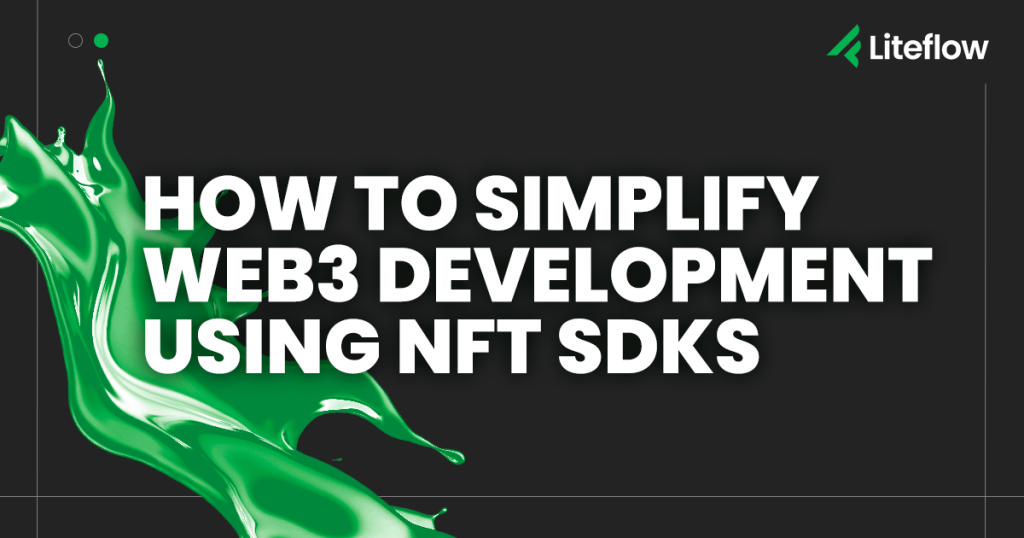How to Simplify Web3 Development Using NFT SDKs

Web3 development presents an array of challenges, and interfacing with the blockchain is one of the biggest. Creating smart contracts, deciphering network information, and managing transactions are just a few of the actions carried out by dApps that require deep blockchain development expertise.
Software Development Kits (SDKs) help aid the building and customization of applications without the full breadth of technical knowledge. While SDKs are not specific to blockchain, NFT SDKs are emerging for developers to more easily build dApp frontends on trusted Web3 infrastructure.
SDKs are not just utilized to optimize speed to market. More importantly, this tooling empowers development teams to focus on the overall product instead of spending time navigating the complexities of parts of the product. Maintaining dedicated infrastructure is also a daunting task, and SDKs prevent builders from the need to maintain critical and complicated pieces of the product overtime.
Customize Your Web3 Product
The goal of any great developer is to build the best product possible. Your product impacts both the experience delivered to your community and the business model driving your revenue. SDKs simplify customization, bringing a trusted and frictionless experience to your users while maintaining flexibility so you can run a Web3 business according to your vision.
Every Web3 product has different requirements, and great NFT SDKs allow for meaningful customization. From design, to build and deployment, developers can more easily create a branded NFT marketplace frontend without the headache of fully customized development. As your NFT community grows, SDKs allow for a personalized experience to be delivered. All the while, your business can incorporate NFT infrastructure unique to your business model, whether that be subscription NFTs, a community wallet, or any other powerful feature made possible via SDKs.
Optimize Speed to Market
Web3 is already highly competitive, as innovators across industries are rushing to seize market share and become recognized leaders in the space. Proper SDKs help streamline development so you can build much faster. While speed is great, confidence is everything. Trusted SDKs ensure that your product can not only be built quicker, but stronger as well.
Many consider SDKs one of the secrets behind rapidly growing Web2 applications, and this trend will continue into Web3. This is for many reasons. Integrations become much easier when your starting point includes existing tools, codes and APIs built for efficiency and dependability. Custom SDK functions eliminate the need to write code from scratch when adding features or new functionality. Instead of focusing on improving pieces of code, developers can spend their time improving higher level functionality and growing the product.
Harness Decentralization
Decentralization is arguably the most transformative value proposition of blockchain technology. A wide range of societal systems have been centralized throughout history, and blockchain represents a paradigm shift in which these very same systems can become decentralized. This is meaningful for a number of reasons, all of which help restore balance to global power dynamics by opening access to everyone and not just a select few.
Decentralized products are trustless, making it possible to verify network transactions without a centralized authority. Blockchain transactions are immutable, meaning they cannot be altered or corrupted. Finally, single points of failure don’t exist within decentralized products, lessening reliance on individuals and protecting networks from attacks and breaches.
One of the clearest examples of centralization vs decentralization in Web3 are cryptocurrency exchanges, and the choice to offer a custodial or non-custodial solution. Several major exchanges provide a custodial trading platform, in which assets must live within the exchange and trading occurs off-chain. This presents risks, as the exchange can refuse the withdrawal of assets, meaning the user doesn’t have full ownership over their tokens.
A non-custodial solution is the opposite, allowing users to have total ownership of their assets. DEXs help facilitate this form of trading without the perils of decentralization, serving more as an easily accessible interface for peer-to-peer P2P transactions. This way, users can always remain in control without reliance on third parties. NFT SDKs deliver trustless and non-custodial solutions, allowing projects to empower their community with true ownership.
A massive amount of Web3 building is already underway, and it will accelerate into the coming years. As Web3 companies continue innovating and new businesses look to delve into NFTs, SDKs will provide a competitive advantage by simplifying the process. Whether it be the ability to increase speed to market or apply more focus to your product at large, NFT SDKs help development teams build and deploy more pressure-tested products that are customizable and decentralized.
Liteflow’s modular and interoperable React NFT SDKs empower Web3 companies to build and customize their dream NFT dApp frontend on Liteflow infrastructure. We bring the flexibility of building Web3 projects according to your needs while helping you own your revenue model for the internet’s next era. If you’d like to explore how to bring your ideas to life, reach out to us at Liteflow, and schedule a call with one of our experts.